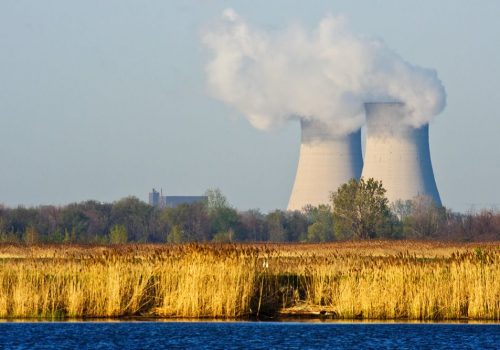Nuclear energy in context: What we’re reading
Michael Liebreich’s piece in Bloomberg New Energy Finance (BNEF), “We Need to Talk About Nuclear Power” made a splash in the nuclear energy policy community when it was published earlier this month. It is an important contribution to the debate, especially since Liebreich praises the value of keeping the current fleet of nuclear power plants online, arguing that Germany’s recent closure of its nuclear plants is “nothing short of a climate tragedy.”
However, Liebreich’s article falters in its discussion of the US policy landscape, failing to portray the nuance with which some of the proponents of the Green New Deal (GND) view nuclear energy. Although Liebreich is correct in saying that the Green New Deal is “silent on nuclear,” he fails to mention that the nonbinding resolution also “doesn’t use the words solar or wind.” Instead, it calls for “clean, renewable, and zero-emission energy sources.” Furthermore, Senator Ed Markey (D-MA), a principal drafter of the GND resolution made clear at an on-the-record session at the Council on Foreign Relations that the Green New Deal “doesn’t ban nuclear power.”
Much of the debate on nuclear energy is still nascent within Democratic circles, but many key Democrats—like Senator Elizabeth Warren—have signaled their willingness to leave the door open to discussions about the existing fleet, while presidential hopeful Senator Cory Booker (D-NJ) was a co-sponsor of the Nuclear Energy Innovation and Modernization Act (NEIMA).
Liebreich also gives short shrift to the ability of advanced nuclear to improve upon the current fleet in time to have a positive impact on the effects of climate change. Additionally, he also that the Korean APR1400 was cheap because “it was light on safety features and dependent on uncertified components.” Ambassador Graham served as a member of the International Advisory Board for the UAE nuclear program for eight years (2009-2017) and, as a result, was briefed twice a year, in-depth, on all aspects of the program, especially safety. It is thus his considered judgement that Liebreich’s assessment is significantly inaccurate. Furthermore, the Nuclear Regulatory Commission issued “key safety and design approvals” last year for the reactor.
Another piece that recently caught my attention is by Michael Shellenberger, a Time Magazine “Hero of the Environment” and president of Environmental Progress, who in February of this year published in Quillette a detailed and perceptive outline on how best to move ahead in the future in fighting climate change. The article, entitled “Why Renewables Can’t Save the Planet,” is based on his TED talk, “How Fear of Nuclear is Hurting the Environment.” He catalogues the virtues of nuclear power and effectively rebuts its critics on issues that have been raised. He also describes with clarity what he argues are prohibitive weaknesses with renewable energy sources, i.e., wind and solar.
Shellenberger says that nuclear plants are “a revolutionary technology—a grand historical break from fossil fuels as significant as the industrial revolution from wood to fossil fuels before it.” However, Shellenberger laments the unpopularity in public opinion of nuclear energy, noting that nuclear energy is faulted for its strengths, which include its high degree of safety.
The current discourse around nuclear energy reflects the extent to which the stakes have grown higher, both for environmental impact and US national security. Therefore, it is all the more important to evaluate debates on nuclear energy critically and in context.
Amb. Thomas Graham, Jr. is executive chairman of the Board for the Lightbridge Corporation and Admiral Richard Mies is president and chief executive officer of the The Mies Group, Ltd. Amb. Graham and Admiral Mies are co-chairs of the Atlantic Council Global Energy Center’s Nuclear Energy and National Security Coalition (NENSC). You can follow the Nuclear Energy and National Security Coalition on Twitter @NENSCoalition
Subscribe to the Global Energy Center newsletter
Sign up to receive our weekly DirectCurrent newsletter to stay up to date on the program’s work.
Image: The Isar nuclear power plant near Landshut, Germany, November 13, 2010 (photo by Bjoern Schwarz/Flickr).
